Hi Everyone,
Update May 20, 2020
As you probably heard, the Alberta Government announced the Alberta Jobs Now Grant. It’s up to $25,000 per employee.
You can find details of that grant on this page.
To stay on top of new grants, you can sign up for my free newsletter at the top of my website.
Have a great day!
Dave
April 17, 2021 Update
Here is an update on the Alberta Relaunch Grant:
Applications for an additional payment of the Small and Medium Enterprise Relaunch Grant for organizations impacted by the April 2021 health public health orders will open soon.
The payment is calculated as 15% of the eligible organization’s pre-curtailed monthly revenue to a maximum of $10,000.
Eligible organizations must demonstrate a revenue reduction of 30% as well as meet the program’s other eligibility criteria.
You can learn more on this page.
If you need to contact them, you need to email them at this address: SMErelaunch.program@gov.ab.ca
Other Resources:
- Monday morning I send out grant deadlines to my email list. You need to sign up to my newsletter to receive them (top bar or side bar).
- You can search grants for free here on my website.
- You can learn about grants on my YouTube Channel or in my book: Golden Grant Rules. It’s available in PDF or Audrey’s BookStore in Edmonton has copies expected April 25, 2021.
You can connect with me on LinkedIn.
Stay strong out there!
Dave
December 8, 2020 Update
Major government announcement yesterday: $15,000 Small and Medium Enterprise Relaunch Grant. Alberta’s government is expanding its relaunch grant to help small and medium-sized job creators impacted by new COVID-19 restrictions.
Learn about the grant on this page.
May 8, 2020 Update:
David Kincade here. Below is a page regarding the first 30 days of the pandemic. I’m keeping it here as a historical source.
The government keeps announcing programs, and I put links to them on this page.
If you want to stay on top up government grants, you can subscribe to my email list by downloading my 5 Grant Gotchas. You’ll then get updates from me.
Download Now! Five Grant Gotchas
There is grant money waiting for YOU! BUT if you step in a “grant trap,” your application is a NO! Learn the FIVE most common errors to AVOID in government grants! Get the 5 Grant Gotchas now to save you countless hours.
If you’re looking to start a business during this time, I put resources on my Start Up page.
If you want to search for government grants, you can use my Free Grant Database.
Need help with grant writing? Please fill out this form: https://albertabusinessgrants.ca/contact-us/
Have a great day.
Dave
Federal Government Business Update
Federal Overview
Here is a good overview of the federal plan: https://www.canada.ca/en/department-finance/economic-response-plan.html#business
Wage Subsidy
CEWS would cover 75% of an employee’s wages, up to $847 per week, for employers of all sizes and across all sectors who have suffered a drop in gross revenues of at least 15% in March, and 30% in April and May.
The program would be in place for a 12-week period, from March 15 to June 6, 2020.
The federal government is also proposing that employers eligible for the CEWS be entitled to receive a 100% refund for certain employer contributions to Employment Insurance, the Canada Pension Plan, the Quebec Pension Plan, and the Quebec Parental Insurance Plan paid in respect of employees who are on leave with pay. https://www.canada.ca/en/department-finance/economic-response-plan/wage-subsidy.html
Temporary 10% Wage Subsidy
NOT 75% wage subsidy – keep reading. The 10% Temporary Wage Subsidy for Employers is a three-month measure that will allow eligible employers to reduce the amount of payroll deductions required to be remitted to the Canada Revenue Agency (CRA).
Note: The Canada Emergency Wage Subsidy, which provides a 75% wage subsidy to eligible employers for up to 12 weeks, is a separate program. For more information on that program, see Canada Emergency Wage Subsidy.
Business Credit Availability Program
This program includes:
-
Loan Guarantee for Small and Medium-Sized Enterprises
EDC is working with financial institutions to issue new operating credit and cash flow term loans of up to $6.25 million to SMEs.
-
Co-Lending Program for Small and Medium-Sized Enterprises
BDC is working with financial institutions to co-lend term loans to SMEs for their operational cash flow requirements.
Eligible businesses may obtain incremental credit amounts of up to $6.25 million through the program.
These programs will roll out in mid-April, and interested businesses should work with their current financial institutions.
The New Canada Emergency Business Account
The Government of Canada is launching the new Canada Emergency Business Account – a new loan program, that will be implemented rapidly by eligible financial institutions in cooperation with Export Development Canada (EDC). This $25 billion program will provide interest-free loans of up to $40,000 to small businesses and not-for-profits, to help cover their operating costs during a period where their revenues have been temporarily reduced. To qualify, these organizations will need to demonstrate they paid between $50,000 to $1 million in total payroll in 2019. Repaying the balance of the loan on or before December 31, 2022 will result in loan forgiveness of 25 per cent (up to $10,000). Additional details on accessing this program will be available soon. https://www.canada.ca/en/department-finance/economic-response-plan/covid19-businesses.html#wage_subsidies
A New Loan Guarantee for Small and Medium-Sized Enterprises
Export Development Canada is working with financial institutions so that they can issue new operating credit and cash flow term loans of up to $6.25 million to SMEs. Businesses should contact their financial institution to determine whether this program is a good fit for their needs. https://www.canada.ca/en/department-finance/economic-response-plan/covid19-businesses.html#wage_subsidies
A New Co-Lending Program for Small and Medium-Sized Enterprises
The Co-Lending Program will bring the Business Development Bank of Canada (BDC) together with financial institutions to co-lend term loans to SMEs for their operational cash flow requirements. Through the Co-Lending Program, eligible businesses may obtain incremental credit amounts of up to $6.25 million through the program. Businesses should contact their financial institution to determine whether this program is a good fit for their needs. https://www.canada.ca/en/department-finance/economic-response-plan/covid19-businesses.html#wage_subsidies
Deferrals
The Canada Revenue Agency will allow all businesses to defer, until after August 31, 2020, the payment of any income tax amounts that become owing on or after today and before September 2020. This relief would apply to tax balances due, as well as instalments, under Part I of the Income Tax Act. No interest or penalties will accumulate on these amounts during this period. https://www.canada.ca/en/department-finance/news/2020/03/canadas-covid-19-economic-response-plan-support-for-canadians-and-businesses.html#Supporting_Canadian_Business
Work-Sharing Program.
Work-Sharing (WS) is a program that helps employers and employees avoid layoffs when there is a temporary decrease in business activity beyond the control of the employer. The program provides Employment Insurance (EI) benefits to eligible employees who agree to reduce their normal working hours and share the available work while their employer recovers. Work-Sharing is an agreement between employers, employees and the Government of Canada. https://www.canada.ca/en/employment-social-development/corporate/notices/coronavirus/employees-factsheet.html
Loans
Canada’s Minister of Finance is in regular contact with the heads of Canada’s large banks, and continues to encourage them to show flexibility in helping their customers whose personal or business finances are affected by COVID-19.
The Office of the Superintendent of Financial Institutions (OSFI) announced it is lowering the Domestic Stability Buffer by 1.25% of risk-weighted assets, effective immediately. This action will allow Canada’s large banks to inject $300 billion of additional lending in to the economy.
The Canada Revenue Agency will not contact any small or medium (SME) businesses to initiate any post assessment GST/HST or Income Tax audits for the next four weeks. For the vast majority of businesses, the Canada Revenue Agency will temporarily suspend audit interaction with taxpayers and representatives.
Employment insurance benefits.
Employees may consider applying for federal Employment Insurance benefits. Allows up to 15 weeks of assistance if a person cannot work due to medical reasons such as self-isolation or self-quarantine. The one-week waiting period for Employment Insurance benefits has been waived by the federal government.
Download Now! Five Grant Gotchas
There is grant money waiting for YOU! BUT if you step in a “grant trap,” your application is a NO! Learn the FIVE most common errors to AVOID in government grants! Get the 5 Grant Gotchas now to save you countless hours.
Provincial Government Business Update
Provincial Overview
Alberta government overview of business supports during COVID-19: https://www.alberta.ca/covid-19-support-for-employers.aspx
Income Tax
Alberta corporate income tax balances and instalment payments will be deferred from March 19 until August 31, 2020 to increase employers’ access to cash so they can pay employees, address debts and continue operations.https://www.alberta.ca/covid-19-support-for-employers.aspx
Alberta farm and commercial customers can defer electricity and natural gas bill payments for the next 90 days to ensure no one will be cut off, regardless of the service provider.
WCB premium payment deferral
- For small and medium businesses, the government will cover 50% of the 2020 premium when it is due in 2021 – saving businesses $350 million.
- Large employers will have their 2020 WCB premium payments deferred until 2021, at which time their premiums will be due.
- Employers who have already paid WCB premiums in 2020 are eligible for a rebate or credit.
Property Tax
Collection of non-residential education property tax for businesses will be deferred for 6 months. Municipalities are expected to set education property tax rates as they normally would, but defer collection. Deferred amounts will be repaid in future tax years.
- Commercial landlords are encouraged to pass savings on to their tenants through reduced or deferred payments to help employers pay their employees and stay in business.
- Businesses capable of paying their taxes in full are encouraged to do so. This will assist the province in supporting Albertans through the pandemic.
Job-protected leave
Full and part-time employees can access 14 days of job-protected leave for the purpose of self-isolation related to COVID-19, retroactive to March 5. The leave does not apply to self-employed individuals or contractors. The requirement to have worked for an employer for 90 days to access COVID-19 specific leave is no longer required. Employees self-isolating due to COVID-19 do not require a medical note to access leave. https://www.alberta.ca/release.cfm?xID=69831287F86B2-0CDB-543B-1137EAA2AD56F3D4#toc-2
Municipalities, charitable and non-profit organizations
Municipalities, charitable and non-profit organizations providing social services support will immediately see $60 million to support their COVID-19 response. The funding will be provided to adult homeless shelters, women’s emergency shelters and the Family and Community Support Services (FCSS) program, which supports municipalities and civil society organizations in providing services to vulnerable Albertans. https://www.alberta.ca/release.cfm?xID=69828242A5FFC-D75A-C83E-690D8028C0C4E09F
Vacation pay, leave or banked overtime
Employers and employees may consider using other available leaves should an employee be required to self-isolate.
- Employees can request using their vacation pay or banked overtime, but employers are not required to grant the request. Provincial employment rules only require employers to provide vacation pay, vacation leave or pay banked overtime within a year of it being earned.
- Employers can request employees voluntarily take vacation leave and/or use their vacation pay or banked overtime, but cannot force them to do so under provincial employment rules.
Energy Relief
The Alberta Government is funding the Alberta Energy Regulator industry levy for a 6 months, achieving $113 million in industry relief. It is extending the term of mineral agreements expiring in 2020 by 1 year to provide increased certainty for industry by allowing additional time to raise capital and plan future activities. The provincial government is providing a $100 million loan to extended the Orphan Well Association to bolster immediate reclamation efforts, decommission about 1,000 wells, and start more than 1,000 environmental assessments – creating up to 500 direct and indirect jobs. https://www.alberta.ca/relief-for-the-energy-sector.aspx
Business Development Bank of Canada
Business Credit Availability Program (BCAP)
The Business Credit Availability Program (BCAP) will allow the Business Development Bank of Canada (BDC) and Export Development Canada (EDC) to provide more than $10 billion of additional support, largely targeted to small and medium-sized businesses. BDC and EDC are cooperating with private sector lenders to coordinate on credit solutions for individual businesses, including in sectors such as oil and gas, air transportation and tourism. The near term credit available to farmers and the agri-food sector will also be increased through Farm Credit Canada.
BCAP Details
BDC is taking additional measures to provide relief to Canadian entrepreneurs during these difficult times. These include:
Working capital loans of up to $2 million with flexible terms and payment postponements for up to six months for qualifying businesses;
Postponement of payments for up to six months, free of charge, for existing BDC clients with total BDC loan commitment of $1 million or less;
Reduced rates on new eligible loans;
Additional details regarding Business Credit Availability Program (BCAP) measures, including industry specific support, to be announced in the coming days.
To read the full press release, click here.
How do I access BCAP? Businesses seeking support through BCAP should first contact their financial institutions for an assessment of their situation. Financial institutions will refer to EDC and BDC their existing clients whose needs extend beyond what is available through the private sector alone. Existing BDC clients should reach out to their account manager for additional information.
Why banks first? Canada’s six biggest banks have made a commitment to work with small business customers on a case-by-case basis to provide flexible solutions to help them manage through these challenges. Banks have a longstanding history of standing by Canadians through challenging times, like now. BDC complements the work of Canada’s private-sector financial institutions, with whom we work closely.
Why is it taking so long? We are receiving an unprecedented volume of requests. We understand the urgency of the situation and have mobilized all BDC teams to respond as quickly as possible.
The federal Minister of Finance released a long press release with several financial announcements. Read it here: https://www.bdc.ca/en/about/mediaroom/news_releases/pages/canada-outlines-measures-support-economy-financial-sector.aspx
BDC Webinar
EXPORT DEVELOPMENT CANADA
Effective March 24, 2020, EDC is stepping up to support all exporting companies by offering their bank a guarantee on loans of up to $5M so that companies can access more cash immediately. For more details, contact your financial institution. https://www.edc.ca/en/about-us/newsroom/edc-covid-business-support.html
The government is changing the Canada Account so that the Minister of Finance would now be able to determine the limit of the Canada Account in order to deal with exceptional circumstances. The Canada Account is administered by Export Development Canada (EDC) and is used by the government to support exporters when deemed to be in the national interest. This will allow the government to provide additional support to Canadian companies through loans, guarantees or insurance policies during these challenging times.
UPDATED FAQs: What Canadian exporters need to know about the coronavirus (COVID-19). https://www.edc.ca/en/article/coronavirus-covid-19-updates-global-trade.html
Export Development Canada, in partnership with the federal government and Canadian banks, will ensure customers facing economic challenges caused by COVID-19 have access to credit. https://www.edc.ca/en/campaign/coronavirus-covid-19.html
On March 15, Premier Kenney announced $500 Million to give Alberta’s public health officials the resources they need to respond to the COVID-19 pandemic and keep Albertans safe. The details are sparse. It’s unknown at this time if any of this capital will be allocated to businesses. Note I will be tracking this allocation closely to determine how it relates to businesses.
Download Now! Five Grant Gotchas
There is grant money waiting for YOU! BUT if you step in a “grant trap,” your application is a NO! Learn the FIVE most common errors to AVOID in government grants! Get the 5 Grant Gotchas now to save you countless hours.
Farm Credit Canada
NOW AVAILABLE – an additional $5 billion to increase Farm Credit Canada’s lending capacity to producers, agribusinesses, and food processors.
ATB Financial
Small business customers can:
- apply for a payment deferral on loans and lines of credit for up to 6 months
- access additional working capital
- Other businesses and agriculture customers can access support on a one-on-one basis.
Employee Impacts
Canada Emergency Response Benefit (CERB)
- Wednesday, the Finance Minister Bill Morneau announced that he was repackaging two aid measures announced last week – the Emergency Care Benefit and the Emergency Support Benefit – into one, simpler program: the Canada Emergency Response Benefit (CERB). Administered by the Canada Revenue Agency (CRA), the new measure will send $2,000 monthly for up to four months straight into the bank accounts of Canadians affected by COVID-19. “The CERB would cover Canadians who have lost their job, are sick, quarantined, or taking care of someone who is sick with COVID-19, as well as working parents who must stay home without pay to care for children who are sick or at home because of school and daycare closures,” the Department of Finance said in an email. https://nationalpost.com/news/ottawa-to-send-2000-per-month-to-covid-19-affected-canadians-but-will-the-system-be-able-to-keep-up?video_autoplay=true
Goods and Services Tax credit
- The Government of Canada is proposing to provide a one-time special payment by early May 2020 through the Goods and Services Tax credit (GSTC). This will double the maximum annual GSTC payment amounts for the 2019-20 benefit year. The average boost to income for those benefitting from this measure will be close to $400 for single individuals and close to $600 for couples. This measure will inject $5.5 billion into the economy.
https://www.canada.ca/en/department-finance/news/2020/03/canadas-covid-19-economic-response-plan-support-for-canadians-and-businesses.html#Income_Support_for
Canada Child Benefit (CCB)
- The Government of Canada is proposing to increase the maximum annual Canada Child Benefit (CCB) payment amounts, only for the 2019-20 benefit year, by $300 per child. The overall increase for families receiving CCB will be approximately $550 on average; these families will receive an extra $300 per child as part of their May payment. In total, this measure will deliver almost $2 billion in extra support.https://www.canada.ca/en/department-finance/news/2020/03/canadas-covid-19-economic-response-plan-support-for-canadians-and-businesses.html#Income_Support_for
- For individuals (other than trusts), the return filing due date will be deferred until June 1, 2020. However, the Agency encourages individuals who expect to receive benefits under the GSTC or the Canada Child Benefit not to delay the filing of their return to ensure their entitlements for the 2020-21 benefit year are properly determined.
Emergency Care Benefit
- Introducing the Emergency Care Benefit providing up to $900 bi-weekly, for up to 15 weeks. This flat-payment Benefit would be administered through the Canada Revenue Agency (CRA) and provide income support to workers, including the self-employed, who are quarantined or sick with COVID-19 but do not qualify for EI sickness benefits. Workers, including the self-employed, who are taking care of a family member who is sick with COVID-19, such as an elderly parent, but do not qualify for EI sickness benefits. Parents with children who require care or supervision due to school or daycare closures, and are unable to earn employment income, irrespective of whether they qualify for EI or not. https://www.canada.ca/en/department-finance/economic-response-plan/covid19-individuals.html#eased_rules_registered_retirement_income_funds
Emergency isolation support
Emergency isolation support
- The Government of Alberta’s Emergency Isolation Support program is now closed after successfully distributing about $91.7 million to 79,596 eligible Albertans since the launch of the program – close to double the amount originally allocated.
Enhancing the Reaching Home initiative
- Providing the Reaching Home initiative with $157.5 million to continue to support people experiencing homelessness during the COVID-19 outbreak. The funding could be used for a range of needs such as purchasing beds and physical barriers for social distancing and securing accommodation to reduce overcrowding in shelters.
Deferrals
- The Canada Revenue Agency will allow all taxpayers to defer, until after August 31, 2020, the payment of any income tax amounts that become owing on or after today and before September 2020.
Emergency Support Benefit
- Emergency Support Benefit delivered through the CRA to provide up to $5.0 billion in support to workers who are not eligible for EI and who are facing unemployment.To support workers and help businesses keep their employees, the government has proposed legislation to establish the Canada Emergency Response Benefit (CERB). This taxable benefit would provide $2,000 a month for up to four months for workers who lose their income as a result of the COVID-19 pandemic. The CERB would be a simpler and more accessible combination of the previously announced Emergency Care Benefit and Emergency Support Benefit. https://www.canada.ca/en/department-finance/news/2020/03/introduces-canada-emergency-response-benefit-to-help-workers-and-businesses.html
Student loan payments
- We are implementing a six-month, interest free, moratorium on Alberta student loan payments for all Albertans in the process of repaying these loans.
Loan and Line of Credits
- Personal banking customers can apply for a deferral on their ATB loans, lines of credit and mortgages for up to 6 months.
- Credit union members will have access to a variety of programs and solutions designed to ease difficulties with loan payments and short-term cash flow.
Food
- Alberta residential customers can defer electricity and natural gas bill payments for the next 90 days to ensure no one will be cut off, regardless of the service provider.https://www.alberta.ca/covid-19-supports-for-albertans.aspxLicensed restaurants and bars can now sell liquor without selling food as part of their take-out – with the exception of drive-thru windows – and delivery services to help keep businesses open, staff employed and additional options for Albertans who are self-isolating.Electricity and natural gas bill payments
Families
- Banks in Canada have affirmed their commitment to working with customers to provide flexible solutions, on a case-by-case basis, for managing through hardships caused by recent developments. This may include situations such as pay disruption, childcare disruption, or illness. Canada’s large banks have confirmed that this support will include up to a 6-month payment deferral for mortgages, and the opportunity for relief on other credit products. These targeted measures respond to immediate challenges being faced across the country and will help stabilize the Canadian economy.https://www.canada.ca/en/department-finance/news/2020/03/canadas-covid-19-economic-response-plan-support-for-canadians-and-businesses.html#Income_Support_for
Education property tax freeze
- Residential education property tax rates will be frozen at last year’s level – reversing the 3.4% population and inflation increase added in Budget 2020.
- This will save households $55 million.
Job Protected Leave
Changes to the Employment Standards Code will allow full and part-time employees to take 14 days of job-protected leave if they are: required to self-isolate or caring for a child or dependent adult that is required to self-isolate. To be eligible, employees will not be required to have a medical note and do not need to have worked for an employer for 90 days. This leave covers the 14-day self-isolation period recommended by Alberta’s chief medical officer. This leave may be extended if the advice of the chief medical officer changes. The leave does not apply to self-employed individuals or contractors. https://www.alberta.ca/covid-19-support-for-employers.aspx
A new Indigenous Community Support Fund
The Government of Canada is providing $305 million for a new distinctions-based Indigenous Community Support Fund to address immediate needs in First Nations, Inuit, and Métis Nation communities.
Global Travel Restrictions
Canada and the United States have agreed to restrict non-essential travel across the border as both countries try to slow the spread of the novel coronavirus — but they insist key supplies will still flow between the two nations. The most important phrase on the government travel advisory website is “New restrictions may be imposed with little warning.”
Federal and provincial public health leaders have recommended that all travellers from outside of Canada self-isolate for 14 days. To limit the spread of COVID-19, the Government of Canada advises that you avoid all non-essential travel outside of Canada until further notice.
$5,000 loan to help secure their timely return to Canada and to temporarily cover their life-sustaining needs while they work toward their return. https://www.canada.ca/en/global-affairs/news/2020/03/government-of-canada-to-provide-financial-assistance-to-canadians-abroad.html
More Information: https://www.canada.ca/en/public-health/services/diseases/2019-novel-coronavirus-infection/latest-travel-health-advice.html
Support for Youth
Interesting COVID Grants
We are seeking prototypes that can help combat current and future outbreaks of the novel coronavirus (COVID-19) and other similar threats. We are specifically looking for prototypes that fall within technology readiness level (TRL) 7 to 9. https://www.ic.gc.ca/eic/site/101.nsf/eng/00101.htmlCOVID-19 Challenge: Made in Canada filtration material for the manufacture of N95 respirators and surgical masks. https://www.ic.gc.ca/eic/site/101.nsf/eng/00102.html
COVID-19 challenge – Low-cost sensor system for COVID-19 patient monitoring. https://www.ic.gc.ca/eic/site/101.nsf/eng/00078.html
COVID-19 Challenge — Point of Care and Home Diagnostic Kit for COVID-19. https://www.ic.gc.ca/eic/site/101.nsf/eng/00100.html
Identify false information and mitigate its effects on generating a true common operating picture, predicting behaviors, and supporting decision making of leaders, small specialized units and information systems; and Deliver supply to isolated individuals and teams. https://www.innovationhub-act.org/challenge-intro
USA
USA Stimulus Package
The House of Representatives voted Friday to approve a massive $2 trillion stimulus bill that policy makers hope will blunt the economic destruction of the coronavirus pandemic, sending the legislation to President Trump for enactment. The legislation, which will send $1,200 checks to many Americans and hundreds of billions to small and large businesses. https://www.washingtonpost.com/us-policy/2020/03/27/congress-coronavirus-house-vote/?utm_campaign=wp_post_most&utm_medium=email&utm_source=newsletter&wpisrc=nl_most
The US$2.2-trillion measure includes US$500-billion to help hard-hit industries and US$290-billion for payments of up to US$3,000 to millions of families. It will also provide US$350-billion for small-business loans, US$250-billion for expanded unemployment aid and at least US$100-billion for hospitals and related health systems. https://www.theglobeandmail.com/world/us-politics/article-giant-us-coronavirus-relief-bill-heads-for-debate-in-house/
Economic Injury Disaster Loan Program
Small business owners in all U.S. states and territories are currently eligible to apply for a low-interest loan due to Coronavirus (COVID-19). Click here to apply.
SBA Express Bridge Loans
Express Bridge Loan Pilot Program allows small businesses who currently have a business relationship with an SBA Express Lender to access up to $25,000 with less paperwork.
Export-Import Bank of the USA
Export-Import Bank of the USA is committed to fully supporting the U.S. exporting community during this crisis. This page will be updated with any information about EXIM’s response activities. https://www.exim.gov/news/exim-board-takes-united-action-response-covid-19-support-exporters-and-jobs-unprecedented
Resources
Guidance for non-health care workplaces during COVID-19: https://www.alberta.ca/assets/documents/covid-19-non-healthcare-workplace-guidance.pdf
The Government of Canada’s Coronavirus disease (COVID-19): Resources for Canadian businesses. https://www.tradecommissioner.gc.ca/campaign-campagne/ressources-entreprises-COVID-19-business-resources.aspx?lang=eng
The Government of Alberta is forwarding business owners to this site to plan for pandemics: https://www.ccohs.ca/publications/PDF/businesscontinuity.pdf
COVID Employee Sheet: https://www.wcb.ab.ca/resources/for-workers/fact-sheets.html
COVID Employer Sheet: https://www.wcb.ab.ca/assets/pdfs/employers/EFS_COVID-19.pdf
Occupational Health and Safety One-Pager on Viruses: https://ohs-pubstore.labour.alberta.ca/bh022
Pandemic Preparedness for Business. Canadian Chamber of Commerce: http://www.chamber.ca/resources/pandemic-preparedness/
Business continuity plan and templates for entrepreneurs: https://www.bdc.ca/en/articles-tools/entrepreneur-toolkit/templates-business-guides/pages/business-continuity-guide-templates-entrepreneurs.aspx
WCB Premium relief for employers: https://www.wcb.ab.ca/assets/pdfs/employers/EFS_Premium_relief.pdf
POSTERS: Help Prevent the Spread https://open.alberta.ca/publications/covid-19-information-help-prevent-the-spread-poster
Download Now! Five Grant Gotchas
There is grant money waiting for YOU! BUT if you step in a “grant trap,” your application is a NO! Learn the FIVE most common errors to AVOID in government grants! Get the 5 Grant Gotchas now to save you countless hours.
Current risk in Alberta
On April 17, Alberta 239 new cases
On April 16, Alberta 162 new cases
On April 15, Alberta 126 new cases
On April 14, Alberta 138 new cases
on April 13, Alberta 81 new cases
On April 12, Alberta 82 new cases
On April 11, Alberta 69 new cases
On April 10, Alberta 49 new cases
On April 9, Alberta 28 new cases
On April 8, Alberta 50 new cases
On April 7, Alberta 25 new cases
On April 6, Alberta 98 new cases
On April 5, Alberta 69 new cases
On April 3, Alberta 107 new cases
On April 2, Alberta 97 new cases
On April 1, Alberta 117 new cases
On March 31, Alberta 64 new cases
On March 30, Alberta 29 new cases
On March 29, Alberta 40 new cases
On March 28, Alberta 79 new cases
On March 27, Alberta 56 new cases
On March 26, Alberta 67 new cases
On March 25, Alberta 61 new cases
On March 24, Alberta 57 new cases
On March 23, Alberta 42 new cases
On March 22, .Alberta 33 new cases
On March 20, Alberta 49 new cases.
On March 19, Alberta 27 new cases
On March 18, Alberta 22 new cases
On March 17, Alberta 23 new cases
Cases in Alberta
davidk@albertabusinessgrants.caCEO, Alberta Business GrantsDavid Kincade, MASincerely,Source: https://www.alberta.ca/coronavirus-info-for-albertans.aspx#toc-1










